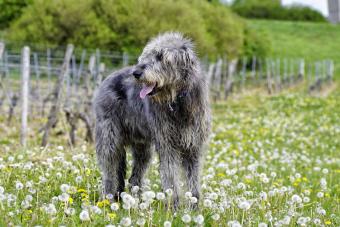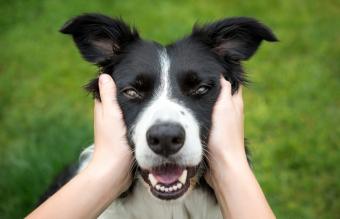
There are some extremely appealing and obedient dog breeds that fit into the "calmer" category, whether you're searching for a lap dog for your child, a companion for an elderly parent, or a dog that's easier to travel with. While it may seem counterintuitive to choose dogs that are less energetic, adding a calm dog breed to your life can have a number of advantages, including having a companion that doesn't require much exercise and is more eager to cuddle.
Calm Dog Breeds
Dogs become calmer, more mature, and less likely to jump up on people as they get older. When a puppy is initially brought home, it's typical for them to knock over an end table or two, but an older dog has learned to control their urges, or at least will be calm enough to be more cautious.
Genetics and puppy socialization often affect a dog's disposition as an adult. However, keep in mind that the reputation of any of these breeds is based on their adult temperament. Puppies of all breeds will be lively and unlimited in their energy. This is why, for those who are elderly or looking for a dog that is already calm, canine behaviorists often recommend an already-trained adult dog, like those from a shelter or rescue organization.
Basset Hound

Basset Hounds are recognized for their softness and low activity. If you have children or other animals in your home, this is a fantastic pick because they get along well with them. However, they have a stubborn character that can make training tough at times. When it comes to instructions like "sit" or "stay," Basset Hounds are more likely to listen, but once the dog has decided on their own decision, those commands may not always be followed through on.
Basset Hounds don't require much exercise, approximately 20 minutes per day, so they're a suitable choice if you want a companion rather than an exercise partner. However, keep in mind that, despite their low energy levels, these dogs still require regular walks, just not as frequently as other breeds.
Irish Wolfhound

Irish Wolfhounds are large, docile dogs who make excellent pets for a calm pet owner. Since they don't require much exercise, you can leave them alone while you go to work or run errands. They also don't shed much, so bringing them along on a trip won't result in hair all over your clothes.
They're extremely affectionate and devoted dogs who are always close to their owners. These characteristics make them suitable pets for families with young children. Irish Wolfhounds, like the rest of the Hound Group, enjoy chasing anything that's moving. This makes them excellent companions for playing fetch, but it may be difficult to socialize them with cats or other fast animals.
Golden Retriever

The Golden Retriever is one of the most popular dog breeds in the world. They're noted for their gentle and peaceful nature, as well as their desire to play and cuddle. If you're looking for a dog that's sweet and affectionate while also being low-maintenance, the Golden Retriever could be the right breed for you. They are so calm that they are frequently used as service animals, meaning they have been taught to assist in medical circumstances.
They get along well with other pets and enjoy learning new tricks and hobbies. Although they demand daily activity, once their needs are addressed, they are peaceful and content, and eager to snuggle up with you on the couch to watch a movie.
English Bulldog

The English Bulldog is a charming canine companion with a lot of personality. They don't require long walks or strenuous exercise, and their bodies restrict them from engaging in prolonged periods of active play. This isn't to suggest they aren't lively; they can be, but only in moderate doses. An owner searching for a peaceful dog with a comic side will like the English Bulldog.
Because this breed isn't hyperactive or sensitive, and they don't have a lot of energy, they don't require any special training or exercise. They do require daily walks and regular visits outside to relieve themselves and expend some energy, but unlike some other breeds, they do not require hours of intensive play.
Great Dane

Great Danes are giant dogs who like to cuddle. This dog breed is known for its gentle nature and loyalty. While it has a formidable size, it is not aggressive or territorial by nature. They love their family and do not like being left alone for long periods of time. A Great Dane will always be happy to see you when you return home from work, or even if you have just been out for a few hours.
Great Dane puppies are known as "mush puppies" because they're so sweet and playful when they're young. They tend to mellow out as adults, but they will still need attention from their owners throughout their lives. Great Danes aren't usually aggressive toward people or other animals, but they can be protective around their owners' homes or vehicles if they feel threatened.
Greyhound

If you're looking for a calm, laid-back dog who won't chew up your furniture or bark incessantly at every passerby, consider adopting a Greyhound. Though they tend to be quiet, these dogs are also fast - the fastest in the world! They will likely spend their days lounging around your house while you work and rest, but they can also get up and move when needed.
In addition to being affectionate and loyal companions, Greyhounds have been known to have great success living with cats and other small pets like hamsters or gerbils. They don't generally snarl or growl, so many people assume they would not make good guard dogs. However, if trained properly from an early age (and given ample exercise) most Greyhounds will happily protect their family from any intruders who wander into the home uninvited.
Great Pyrenees

The Great Pyrenees is a large, charming dog with a reputation for being calm and balanced. Due to their size and protective nature, they are not the greatest choice for every owner. They are kind and relaxed with their human families if they were raised with children. They do need regular exercise and are best suited to a household with a fenced yard and humans who are ready to interact and raise them to be a calm adult.
Although Great Pyrenees dogs are devoted to their owners, they have an independent streak that can make training challenging at times. However, puppies will remember what they learn for the rest of their lives, so once they are trained you can rest assured they will be obedient.
Pug

Pugs make wonderful lap dogs. They are active and friendly, but they are also kind, affectionate, and good with children. Pugs don't require much exercise because they aren't particularly lively. All they need is a daily walk; otherwise, their energy levels will remain low throughout their lives.
These dogs can be stubborn, and they enjoy being independent thinkers, but this attribute isn't usually harmful unless it interferes with training, which isn't difficult with this breed due to their easygoing disposition. They're also often good with other animals, especially cats.
Newfoundland

Newfoundlands are a huge breed with a kind temperament. They have webbed paws and a thick coat that protects them from the cold water during rescue missions, a trait they share with other water dogs such as Labrador Retrievers. The thick coat makes grooming simple; all you have to do is brush it every now and then and dry it off after swimming or bathing your dog. The breed does not require frequent baths because they have natural oils that help keep their skin healthy.
Newfoundlands are confident but not aggressive, and they're well-known for being gentle with children and other pets. They rarely defend their territory unless provoked or threatened by another animal or person. Their peaceful demeanor makes them easy companions on walks in the park or car drives around town when you're running errands together every day; they'll always want to be with their people.
Cavalier King Charles Spaniel

The Cavalier King Charles Spaniel is a toy-sized dog with a short nose who can be trained to sit and stay easily. The puppies are kind, playful, and good with children, making them a wonderful family dog. They have great instincts to please their owners, making them ideal companions for the elderly or people with restricted mobility.
Cavaliers are more affectionate than other spaniels, although they still have a tendency to bark. When strangers approach their houses or when unfamiliar dogs invade their territory, which can extend from your yard to a whole neighborhood, they do have a tendency to bark excessively.
Pekingese

The Pekingese, a small dog breed that originated in China and has been around for hundreds of years, is recognized for their lion-like appearance. The Chinese imperial family had held it for generations, and it was first transported to Europe in 1860.
These dogs are devoted companions who thrive on human love and attention. The demeanor of the Pekingese can range from quiet, reserved, and reserved to active and fun-loving, but don't expect a rambunctious clown. Since this dog is intelligent but stubborn at times, training can be more difficult than with many other breeds.
Finding a Calm Canine Companion
Ultimately, if you want a calm pet, unless you have experience with the breed in question, then it might be wise to consult breeders and shelter employees who have more experience with that breed. If you want a puppy, then the best way to find out about their adult temperament is through research after you've made your selection. Choosing the right breed for your particular household and lifestyle will ensure that both you and your pet are happy.







